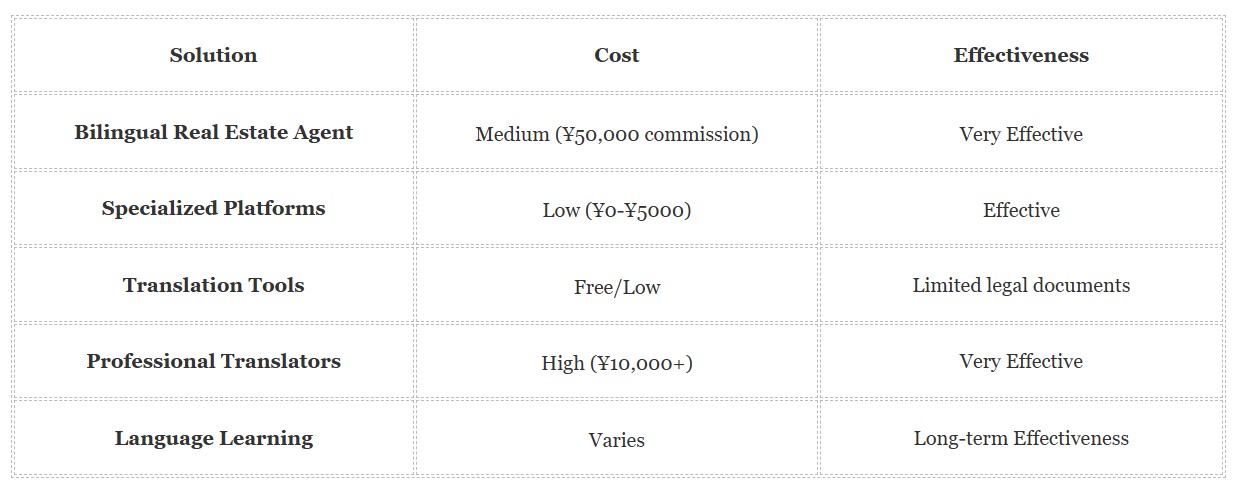WEDNESDAY, DECEMBER 18, 2024
Navigating the Japanese real estate market can be a daunting experience for non-Japanese speakers, primarily due to language barriers. These manifest challenges in the form of complex legal terminology, untranslated property listings, and communication hurdles. This guide explores the issue and provides practical solutions, supported by expert advice, data, and case studies.
Language in Japanese real estate stem from the country’s heavy reliance on the Japanese language barriers for property listings, legal documents, and communication. For non-Japanese speakers, this exclusivity leads to restricted access to information, potential misunderstandings in legal agreements, and difficulties in negotiations. This creates a unique set of challenges for expatriates and foreigners, but with the right tools and strategies, these obstacles can be effectively overcome.
The Japanese real estate industry operates predominantly in Japanese. This linguistic exclusivity can deter foreigners from engaging in the market and often leads to:
1. Restricted Access to Property Listings: Most property listings are only available in Japanese, limiting the search options for non-Japanese speakers.
2. Complicated Legal Processes: Real estate transactions require understanding contracts, tax regulations, and legal documents, all written in Japanese.
3. Miscommunication in Negotiations: Effective communication with real estate agents, landlords, and legal professionals can be hindered, increasing the risk of misunderstandings.
1. Limited Access to Information
Non-Japanese speakers often struggle to find comprehensive property listings in their native language. Popular real estate platforms like Suumo and Homes.co.jp cater primarily to Japanese audiences, restricting foreigners to a narrower selection of properties. This can lead to missed opportunities and reliance on less-than-ideal options.
2. Legal and Financial Complexities
Real estate transactions in Japan involve multiple layers of legal and financial intricacies, such as renewal fees, key money (“reikin”), and maintenance costs. Non-Japanese speakers face difficulty interpreting these clauses, increasing the risk of unexpected expenses or disputes. Legal documents, contracts, and tax filings all present challenges when they are not properly translated or explained.
3. Communication Gaps
Negotiating with landlords, agents, or legal professionals requires clear and precise communication. Language barriers often hinder these discussions, leading to misunderstandings or even failed negotiations. For example, cultural nuances such as the expectations around gift money or specific lease conditions may not be conveyed accurately.
1. Hire Bilingual Real Estate Agents
Bilingual agents are instrumental in bridging communication gaps and providing cultural insights. These professionals can:
– Translate property descriptions and legal documents.
– Negotiate on behalf of their clients.
– Explain the cultural context of certain practices.
2. Use Specialized Real Estate Platforms
Platforms like GaijinPot Housing and Housing Japan offer multilingual services tailored to foreign residents. These platforms provide:
– Listings in multiple languages.
– Step-by-step guides for navigating the property market.
– Support for lease agreements and visa-related queries.
3. Leverage Translation Tools
Translation apps such as Google Translate and DeepL can be useful for basic communication and understanding property listings. While these tools are not a substitute for professional translators, they can provide preliminary insights.
4. Hire Professional Translators
For critical documents like contracts, engaging a professional translator ensures accuracy and minimizes the risk of legal misunderstandings. Although this service may be costly (¥10,000-¥15,000 per document), it provides peace of mind.
5. Invest in Japanese Language Learning
Learning basic Japanese can significantly improve your ability to navigate the real estate market. Resources like Duolingo, WaniKani, or local language schools offer courses that focus on practical communication skills, which can be particularly helpful for understanding property descriptions or engaging in simple negotiations.
1. Search for Properties: Use platforms with bilingual support or hire a bilingual agent.
2. Understand the Legal Process: Translate contracts or hire a professional translator.
3. Negotiate Terms: Work with agents to clarify terms and conditions.
4. Sign Contracts : Ensure translated versions are reviewed and verified.

